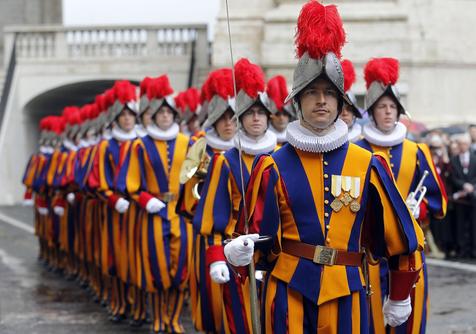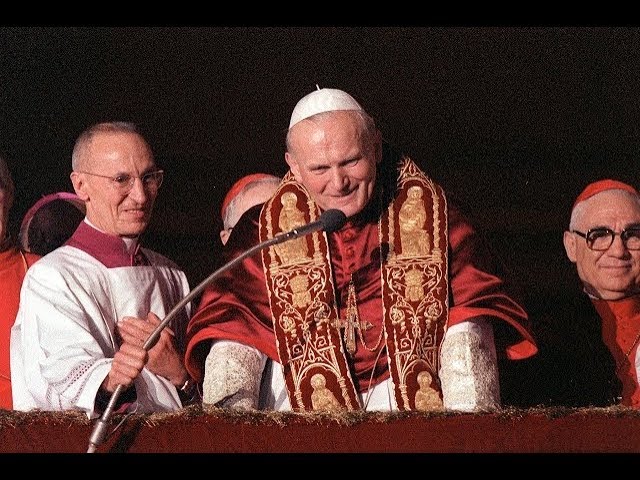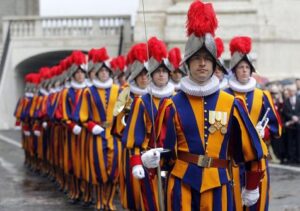
On Christmas Eve 1986, Andreas Widmer made his first service as a Swiss Guard in the service of Pope John Paul II, his boss.
The first meeting between the two took place as St. John Paul II was walking out the door of his papal apartment and on his way to celebrate midnight mass. Who would have thought the young Widmer that Karol Wojtyla would at that first moment make an indelible impression on him!
It was the pontiff's great ability to be in what he was doing that made him aware of the personal circumstances the young, novice Swiss guard was going through. Circumstances that caused him uneasiness, until St. John Paul II initiated the conversation.
Widmer was young, longing for his family at the height of the Christmas and was feeling a bit depressed and lacking in confidence. He had not discussed this feeling with anyone.
John Paul II approached him and said: "It is clear that this is your first Christmas away from home! I appreciate very much the sacrifice you are making for the Church. I will pray for you tonight at Mass." None of his colleagues and friends had noticed his anguish that night.
It had to be the leader of 1.2 billion Catholics who took notice, and gave him a lesson in the leadership of one who is willing to serve.

And to keep his eyes raised and set in the distance. "John Paul always had the perspective of my whole life when he spoke to me. I am convinced that this is a natural consequence of his long years of dedication to the university as chaplain.
On one occasion he stopped to talk to me. He wanted to know how I was doing and whether I liked being a Swiss guard very much or not. I told him about my occupations and concerns, all of which were focused on the short term.
He helped me move from a short-term vision to a long-term vision for the rest of my life. According to Widmer the pontiff always pushed him to reach for higher goals and not to stay ensconced in mediocrity. "He pushed me to think big."
"Every time I talked to Juan Pablo, Even when I just stopped by to say hello, he made me feel like I was the reason he got up that morning."
Let's go back to Widmer's first meeting with his new boss on that Christmas Eve. Widmer admits that he felt sad and determined to leave the service. He thought at the time that he had made a tremendous mistake by signing up for the Swiss Guard Corps.
When the pope left his apartment, he could have simply walked past. "But he didn't just walk by. He stopped and realized that I was troubled and the real reason for my circumstances. He had the fine ability to notice things at the precise moment, to pick up on the true feeling of the people he came across."
John Paul made people feel special because he was present. This is a common trait in a leader who inspires people.
"People who tell me that they work for leaders who inspire them almost always comment that their boss makes them feel like they are the most important person at that moment in that room and that their boss genuinely cares about their well-being."
"Juan Pablo had more faith in me than I had in myself," Widmer said. "That boosted my self-esteem and allowed me to achieve more than I would have thought possible. He believed in me before I believed in myself."
Leaders who inspire believe in people, often even more than they believe in themselves and more strongly. We have the example of millions of young people around the world whose self-esteem grew because John Paul II inspired them by believing in their potential and left them with the message "Do not be afraid."

According to Widmer, "John Paul II spoke of work not as a burden but as an opportunity to become what we are called to be. He firmly believed that it is the work what makes us truly human.
John Paul believed that when we work we not only "make more"; in his encyclical letter Laborem Exercens the pope wrote: "Work is a fundamental dimension of Man's existence on earth".
John Paul II celebrated the phenomenon of entrepreneurship because creating something from nothing is a fundamental aspect of all spirituality.
"Just as those who believe have Faith in their Creator, so too must the entrepreneur have Faith in their vision, Faith in the team's ability to execute the vision, and Faith that what they set out to bring to fruition is intensely connected to something greater than themselves."
John Paul II convinced Widmer that entrepreneurship was a great path on which to build his life, a path on which he could utilize his giftsThe goal is to develop their talents, talents and ideas to their full potential and thus participate in the work of creation.